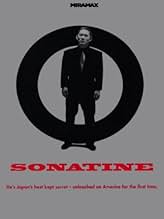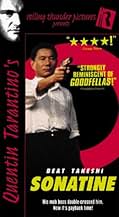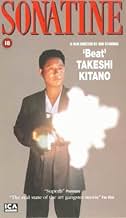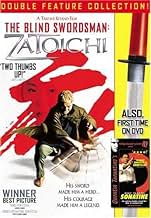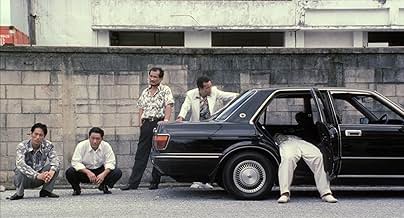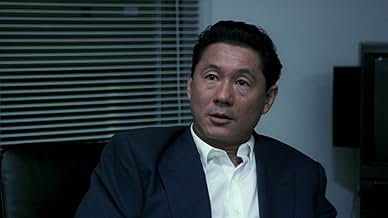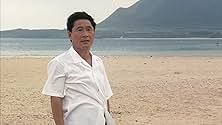गैंग वॉर को समाप्त करने के लिए कई याकूज़ा टोक्यो से ओकिनावा मदद के लिए भेजे जाते है. युद्ध बढ़ता हैऔर टोक्यो के बदमाश समुद्र किनारे छिपने का विचार करते है.गैंग वॉर को समाप्त करने के लिए कई याकूज़ा टोक्यो से ओकिनावा मदद के लिए भेजे जाते है. युद्ध बढ़ता हैऔर टोक्यो के बदमाश समुद्र किनारे छिपने का विचार करते है.गैंग वॉर को समाप्त करने के लिए कई याकूज़ा टोक्यो से ओकिनावा मदद के लिए भेजे जाते है. युद्ध बढ़ता हैऔर टोक्यो के बदमाश समुद्र किनारे छिपने का विचार करते है.
- पुरस्कार
- 4 जीत और कुल 1 नामांकन
फ़ीचर्ड समीक्षाएं
In that sense, the internet-famous cover photo of writer/star/director Takeshi Kitano grinning broadly while holding a gun to his head is a precise depiction of the film's themes. These gangland thugs might be all business when they're intimidating store owners or trading bullets with a rival gang (nary an eyelash is batted when Kitano and company dunk a victim for too long and accidentally drown him), but on their down time, they need to cut loose, have a few laughs and make human connections, too. The really interesting points are where those two opposite modes meet, a jolting transformation when light amusement slams into stone-serious reality and all the easy smiles melt. There's always a momentary hesitation where we can't be certain which way the scales will tip, and that's dangerously exciting. Those key moments take time to develop, though, which leads the plot to really sag in the middle.
Kitano performs very well as the central figure, a stark dichotomy of incompatible moods, but he can't be on-screen at all times and isn't always surrounded by the best supporting talent. A strong thematic concept, one which evidently developed live in the field as the script was extremely bare bones, but not especially well-executed. Loaded with promising ideas, much of Sonatine's ephemeral potential depends upon what you, the viewer, are willing to bring to the table.
A masterpiece of minimalism, 'Sonatine,' is a powerful, quiet film that speaks volumes without the need for words. Written and directed by Kitano, the film parodies the conventions of gangster films whilst playing into them, showing how facile and vacuous the majority of them are. The film strikes the perfect balance between introspection and sudden, whirlwind action, containing no unnecessary moments, stylizations or lines of dialogue. It is an economic, intelligently constructed movie that simmers steadily over its' runtime up to a terrific boil of violence, nihilism and existentialist depth.
'Sonatine' is oft compared to the films of Jean-Pierre Melville, in particular 'Le Samouraï.' Indeed, both films adopt a nihilistic attitude towards violence and feature long sequences containing limited dialogue. This allows the audience to experience the film's atmosphere and take themselves into the mind of the characters in a manner unfettered by extraneous noise. However, 'Sonatine' is less emotionally frigid than the work of Melville, and contains much humour; something rarely if ever found in Melville's movies. It is- on the whole- a far more entertaining cinematic experience; not to mention being a more rewarding intellectual one.
The film is shot by Katsumi Yanagishima, who worked on Kitano's previous efforts 'Boiling Point' and 'A Scene at the Sea.' Under Kitano's firm guidance, his cinematography is understated and naturalistic, producing haunting visuals that linger in the mind long after the credits have rolled. Kitano's films rarely if ever feature orthodox composition or framing of images, and the fresh, organic and off-beat approach to visuals in his movies is continuously striking and distinct. Yanagishima would go on to work on Kitano's next thirteen directorial features; though their collaboration on 'Sonatine' may still be their crowning achievement.
'Sonatine' features the work of another frequent collaborator of Kitano's: composer Joe Hisaishi. His score is beautiful, mournful and melodic; drifting through the film like a euphonious wind. There are few partnerships between composer and director as fruitful in cinema, perhaps only that of David Lynch and Angelo Badalamenti comes close. Hisaishi's work is muted and evocative, adding unquestionable power and depth to the proceedings. Hisaishi worked on seven of Kitano's films, and never once was his score anything other than mellifluous, pure and unobtrusive; as it is in 'Sonatine.'
Additionally, the film boasts a commanding central performance from Kitano as Murakawa. Few have a presence on screen as magnetic and quietly confident as Kitano. He performs with an unabashed ease and an unmatched stillness; seeming like a silent Cheshire cat without the grin, noting the proceedings around him with prescience and irony. His Murakawa is a composed man capable of extreme brutality, one tired of his existence and all too used to the grind and violence of life. Kitano fully becomes this character in so subtle a manner some might think he isn't doing anything at all; the highest compliment any actor can be paid.
His supporting cast features many talented performers working at the top of their games, most notably the great Susumu Terajima and the late Ren Ôsugi; both frequent collaborators of Kitano. Here, Terajima stars as Ken, one of Murakawa's underlings, delivering an assured performance of depth and wit. Ôsugi is equally outstanding, playing a smaller role as an associate of Murakawa's named Katagiri; though still impressing with his range and naturalness.
Takeshi Kitano's 'Sonatine' is a brilliant crime film of the ascetic variety that is unforgettable and unique. On every level, the movie impresses, from the excellent performances to Katsumi Yanagishima's striking visuals; and of course the stirring score from Joe Hisaishi. It is- for lack of a better term- the thinking man's crime film, as it contains moments of profundity and silence that would no doubt put many off or leave them clamoring for more action. In short, 'Sonatine' is a memorable, mature masterpiece of minimalism from an original, incomparable auteur. If you haven't seen it before, watch it now; 'Sonatine' is not to be missed.
Some 18 months on and I still love the film and is certainly one of my top five international films. I have seen Kitano's latter films, Hana-bi, Brother, Tokyo Eyes & Gonin, and even though production values have improved, especially with Brother and Hana-Bi, I personally feel that Sonatine still remains Beat's best film to date.
In retrospect one can see within the film a vision of Beat's state of mind at the time. It is no secret that he tried to commit suicide in real life shortly after the completion of Sonatine. With this in mind it is easy to understand the motive within film and how it is structured within Kitano's head.
Even though it is a film about Yakuza and gangland killings Kitano doesn't fill every scene with a running commentary or 100mph action-fests. Instead Sonatine is very much an avante-garde kind of film with the "action" taking a backseat to the humdrum lives of the gangsters themselves.
Kitano is the boss of a successful Yakuza mob in central Tokyo at the expense of its poorer rivals. As a consequence a plot is hatched to get him and his members on a meaningless trip to Okinawa to sort out a peace-deal between waring factions and thus leaving his "patch" vulnerable to a take-over.
So Kitano's gang arrive in Okinawa only to find that there is no such "deal" but instead his gang are steadily killed off leaving only himself and 3 other gang members and an abandoned young woman, whom he saves from a rape ordeal by her husband
They move to the coast well away from central Okinawa and wait for the troubles to calm down before considering returning to Tokyo. During that time they have very little to do other than play beach games, sing songs or play Russian Roulette in order to pass the time.
But eventually even the beach hut where they live is no longer safe from the assassin's bullet and so Kitano has no other choice but to face his rivals once and for all in a bloody gun battle finale.
And so ends the film. It is not a happy film with no satisfying "Hollywoodesque" ending. Far from it, the ending only illustrates the working mind of Kitano at the time. In fact there are many examples within the film that underlines the bleak suicidal tendencies of his mind for real, especially the Russian Roulette scene.
It is also interesting that these gangsters think nothing of their own lives or safety: they accept their fate as a death-wish. They have witnessed so much death in their lives that they have lost their morality & humanity in themselves and to other people. So it is no surprise that during the various gun battles between rival groups neither Kitano or his men hide behind furniture in order to avoid the bullets. Instead they stand erect like statues firing their guns, hoping for the best waiting to be killed by their enemy in full view.
The life of the Yakuza in the context of this film, therefore, counts for little. They have no life, only a limited existence. There are few highlights - such as the Sumo scene, the firework fight and even the scene where Aya Kokumai removes her t-shirt in front of Kitano so that she is semi-nude before him. And yet not even this makes an impression on him. He is has become such an empty shell that even his sensual nature has long since gone, such is the life of a Yakuza warlord.
Critics would argue that this film is too anal for its own good, that nothing much happens and that the film is punctuated with "to camera" shots of the main protagonists looking vacant at the audience waiting for something to happen.
In my opinion these critics miss the point. There is a reason why they stare back at the camera/audience. There is no sparkle in their eyes, no smile playing on their lips, no supple skin tone, no positive body language to tell us that these people are really happy. Instead, we see nothing but ghosts, empty husks of humanity awaiting their fate with the silver bullet; they look at us as if they are pleading with us to put them out of their sad existence. They may have guns, the money, the power but they are not happy, they are not content, they are not you and me!
Sonatine remains one of the most influential films ever to come out of Japan. So impressed was I with this film that I created this IMDb login in honour of its majesty. Yes, it maybe seen as a sad act to name a login after a film but for me Tekeshi Kitano has yet to direct a better film and Sonatine will haunt me for all sorts of reasons for years to come, especially the excellent score from Joe Hisaishi.
*****/*****
क्या आपको पता है
- ट्रिवियाThe title Sonatine comes from the musical term sonatina. Kitano said that when learning the piano, when the learner gets to sonatinas they have to decide where they want to go, whether it is to classical, jazz or popular music; marking the point of crucial decision making. This refers to the character Murakawa in the film.
- भाव
Miyuki: You're tough. I love tough guys.
Aniki Murakawa: I wouldn't carry a gun if I were tough.
Miyuki: You can shoot without a second thought.
Aniki Murakawa: I shoot fast because I get scared fast.
Miyuki: But you're not afraid of dying, are you?
Aniki Murakawa: When you're scared all the time, you reach a point when you wish you were dead.
- क्रेज़ी क्रेडिटAt the end of the closing credits, various shots of the beach that were taken a year or so later, are included.
- कनेक्शनFeatured in Century of Cinema: Nihon eiga no hyaku nen (1995)
टॉप पसंद
- How long is Sonatine?Alexa द्वारा संचालित
विवरण
बॉक्स ऑफ़िस
- US और कनाडा में सकल
- $58,834
- US और कनाडा में पहले सप्ताह में कुल कमाई
- $17,527
- 12 अप्रैल 1998
- दुनिया भर में सकल
- $58,834
इस पेज में योगदान दें



